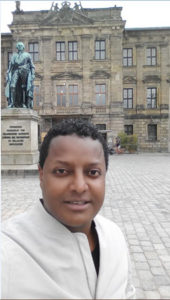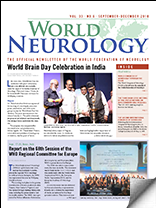By Biniyam Alemayehu
I would like to thank WFN and the German Neurological Society for giving me this rare educational opportunity to visit one of the state-of-the-art neurology centers. On my first day at the Universitätsklinikum-Erlangen, Department of Neurology, I was warmly welcomed and introduced to all the staff by Prof. Hagen B. Huttner, as Prof. Stefan Schwab was on the leave, who I had an opportunity to meet on the following Monday. He also warmly welcomed me. Prof. Huttner arranged weekly rotational visits for me in the following fashion:

Week 1: Emergency room
Week 2: Stroke unit and neurointensive care unit
Week 3: Electrophysiology unit
Week 4: Epilepsy unit
Week 1:
During my one-week observation in the ER, I had the opportunity to observe first-hand how patients are handed over from paramedics to a treating ER neurologist. I also saw how they quickly engage in evaluating the patients and investigating the patients based on patient complains, especially their approach to stroke patients. These patients are possible candidates for IV thrombolysis, in which the neurologist and ER nurses are highly organized and coordinated in immediately preparing the tPA kit and taking the patient to the CT scan room, in the overall effort to minimize door to needle time.
I had an opportunity to observe the “Teleneurology” service at the ER, in which those nearby health facilities, networked with Universitätsklinikum-Erlangen, had a real-time video discussion with the neurologist in charge and consult the patient’s condition and imaging.
Week 2:
During my second week, I had the opportunity to attend daily rounds at the stroke unit and was able to observe the quality of care that intermediately sick patients with different neurological disorders, including stroke, TIA, GBS, and brain tumor patients, get during their admission to the unit.
I also had an opportunity to visit the neurointensive care unit, a 12-bed unit, equipped with state-of-the-art neurocritical care equipment, including continuous EEG monitoring.
Week 3:
In my one-week observation in the electrophysiologic unit, I had an opportunity to observe how ultrasound guided EMG is done in different patients with neurological disorders. I also had an opportunity to observe while other EDx tests are done, including NCS, and evoked potentials. Finally, I had an opportunity to observe botulinum toxin injection sessions for patients with blepharospasm, hemifacial spasm, and spasticity.
Week 4:
During my final week at the hospital, I attached to the epilepsy unit, helping with 24-hour EEG monitoring in patients who need pre-surgical evaluation and for diagnostic purposes.
In our Setup
During my four week stay at U.K.-Erlangen hospital, I had an opportunity to observe how patients with different neurological disorders are managed in an ideal setup. As the second most populous country in Africa and home to different international organizations, its high time for us to establish at least one neurology care center that can give a standard neurological care to our patients and become a center for neuroscience research.
I am fully aware that this is a long shot, but we need to work hard and push the policymakers to give due attention on the need to have at least one excellent neurology center, which will have a well-equipped ER, neurocritical care units, stroke unit, and epilepsy units in Ethiopia. In the meantime, I am highly motivated and enthusiastic to improve the current neurology care in our facility by using the experiences I acquired at U.K.-Erlangen. I am planning to work hard in the following areas as a priority:
- Creating public awareness about stroke and TIA and establishing a referral network system with nearby hospitals.
- Short of availability of tPA, optimizing stroke care, by establishing a stroke unit and improving neurorehablitation for our patients.
- Optimizing emergency management of patients with neurological disorders.
- Strengthening our electrodiagnostic unit by increasing the number and quality of the tests we do currently.
- Strengthening the care we are giving our epilepsy patients currently.
- Training our staff in different neurology fellowship training in order to keep improving the current care and ability to accommodate ever increasing neurosciences care.
I’m optimistic that the future is brighter for neurologists like me. Such a departmental visit gave us the highlight of how care for patients with neurological disorders are much advanced and ever growing in the future.
I am hopeful that both WFN and DGN will keep helping our hospital in the future, especially in capacity building of our staffs and in our effort to improve the neurology care in Ethiopia. I’m really fortunate to have met Prof. Stefan Schwab, who is really interested in establishing future collaboration between his hospital and our hospital. I hope he will visit our center in the near future and support our endeavors.
Finally, I would like to thank all the staff at Universitätsklinikum-Erlangen for their hospitality during my rotation at different units. •
Biniyam Alemayehu is assistant professor of Neurology at the AAU College of Health Sciences in Addis Ababa, Ethiopia.
